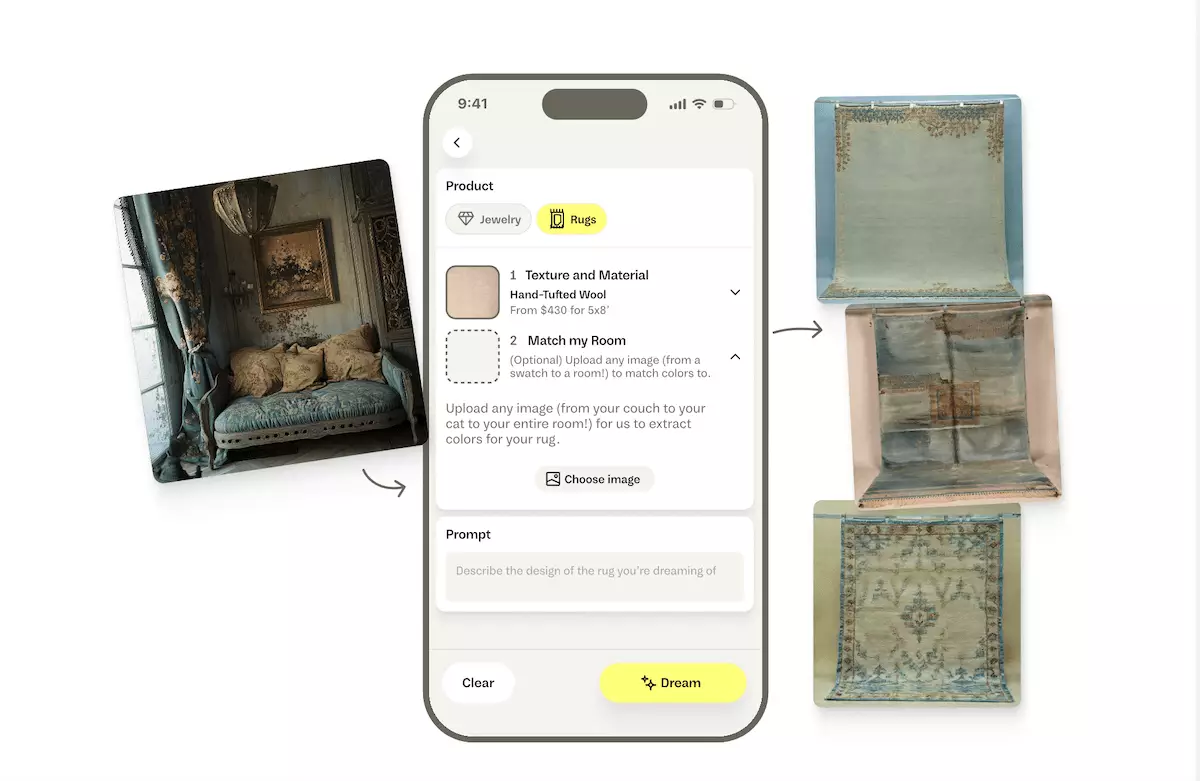At the intersection of technology and creativity, Arcade is emerging as a beacon of innovation with its recent expansion into home goods, starting with the introduction of customizable rugs. This generative AI marketplace, initially focused on jewelry design, has turned its gaze towards domestic aesthetics, reshaping how individuals envision and create their living spaces. With the launch of intriguing features like “Match My Room,” users are offered an unprecedented ability to merge personalization with practicality, making home design both accessible and engaging.
Unpacking the Match My Room Feature
The “Match My Room” feature stands out as a notable advancement, enabling users to upload photographs of their interior spaces. This tool takes a step toward seamless integration of design elements by analyzing existing color schemes but has its limitations. Notably, while it excels at color matching, the AI struggles to replicate intricate patterns from other decor items, a capability that could enhance user experience significantly. This shortcoming invites the question: how rapidly can technology evolve to meet the nuanced demands of home design? Nevertheless, the function remains a valuable asset for users to ensure that the new rug design harmonizes with their current furniture, bridging the gap between digital creativity and real-world application.
Rug Creation Simplified: From Concept to Creation
The rug design process mirrors how Arcade previously operated within the jewelry sector. Users can select materials ranging from hand-tufted wool to luxe options like cashmere and mohair, posting a text-based description to guide the AI in crafting their dream rug. This sophisticated algorithm, influenced by platforms such as Midjourney and Stable Diffusion, promises designs that cater to varied stylistic preferences. The additional step of receiving a free sample adds a layer of assurance, allowing buyers to experience their design’s quality and aesthetic before committing a financial investment. Starting prices around $400 for a basic rug, while steep, are positioned as a more affordable alternative to luxury retailers that often demand exorbitant figures.
Empowering Users: The Dream Boards and Seller Programs
Arcade’s inclusiveness extends beyond product creation to community engagement. The introduction of “Dream Boards” serves as a parallel to platforms like Pinterest, fostering a space for creativity and inspiration. These boards allow users to merge ideas and discover styles, cultivating a community where shared aesthetics promote commerce. Accompanying this initiative is Arcade’s seller program, which enhances its appeal for entrepreneurial users. By increasing the commission structure and launching an affiliate program, Arcade is strategically aligning itself with content creators and influencers poised to drive traffic to the marketplace. This collaborative ecosystem not only incentivizes sales but builds robust relationships between the brand and its creators.
The Financial Backing to Drive Innovation
The recent completion of a $25 million Series A funding round speaks to the growing confidence investors have in Arcade’s vision. With influential investors backing the venture—individuals like Ashton Kutcher and Reid Hoffman—the company is poised to make significant strides in scaling operations. With fresh capital earmarked for hiring, platform enhancement, and the introduction of further product categories like ceramics and clothing, Arcade seems destined for explosive growth. The founder, Mariam Naficy, brings a wealth of entrepreneurial experience from previous ventures, which bodes well for the company’s trajectory.
A Brighter Future for Customization in Home Design
Arcade’s ambitious plans highlight a compelling future for customizable design in home goods, underpinned by advanced AI technology. With its focus on user engagement, creativity, and a strong community ethos, the company is set to redefine standards in home styling. As they eye expansions into diverse categories, including apparel and leather goods, questions surrounding the scalability of their business model arise. If successfully executed, Arcade may not just be revolutionizing how we design our homes; they might be setting the stage for an entirely new market space where personalization, technology, and community thrive in unison.

